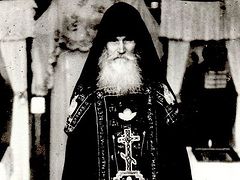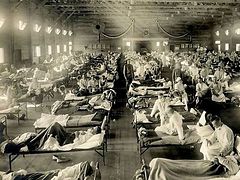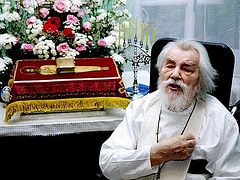“I came out of the intensive care unit!” An Orthodox clergyman, with a case of the Coronavirus, talks about his ordeal.
That Saturday morning, March 28, the first clouds appeared, foretelling the impending storm that suddenly and unexpectedly entered my life.
It started out as a common illness, like an ordinary flu, and soon turned into something unknown, which we didn't even want to accept as a possibility.
The high fever and the intense cough slowly began to give us the idea that the most nightmarish scenario had invaded our home and brought trouble into our lives.
Positive test results for the Coronavirus simply confirmed what we already knew. From then on, things changed very quickly: the ambulance arrived, picked me up, provided an oxygen respirator, and we entered the hospital.
There were already many patients in the hospital, with the same or worse condition: beloved grandparents, middle-aged ladies who used to be full of vitality and creativity, but also young people. I came to join them.
An Orthodox Greek clergyman among dozens of people who are thirsting for life, like me; who are fighting to survive just like me, who are loved by our God, just like me.
They soon put me in a room with extremely high-quality amenities. I think this is the only time I've noticed the comforts of a hospital. In the greatly difficult moments, you surprisingly care about and appreciate the little things.
During these moments, all the existential questions arise, and your soul struggles to find the answers. These are the hours when the heart hurts asking, “Why me?” only to give the answer itself a little later: “Why not me?”
Doctors and nurses of many specialties were found for me, with an unprecedented sense of responsibility and caring for me, x-rays, examinations, and tests.
A war had just begun, a war with time, with the virus, with side effects. Antibiotics along with paracetamol slowly enter my bloodstream through the serum, and wage an unequal battle with the virus.
Meanwhile, news travels fast. My parishioners were shocked, but they are praying and hoping. Some come out of the closed church and anxiously ask God.
Our Metropolitan Athenagoras calls every day to find out more details. At the convent of the Nativity of the Theotokos in Asten, they pray in front of the relics of Saint Nikiphoros the leper.
In Greece, a Metropolitan, my old classmate and good friend, publishes the news on the internet and immediately begins a prayer chain: lay people, monks, elders, bishops, parishes, monasteries from Mount Athos all the way to Jerusalem, all joined in their prayers. I learn all this from my family, and I am moved. I take courage and fight.
The doctor is anxiously watching the oxygen levels drop dramatically. He decides to take me to the intensive care unit urgently. The virus has infected both lungs. My fever has risen to 40 c., and anti-inflammatories are unable to treat it.
At that moment, a brother's friend called me. He conveys to me the words of a blessed monk from Mount Athos: “Tell him not to be afraid, he will be fine. The Panagia loves him and will heal him. He fell ill that a miracle would happen, that they too would believe (meaning the Belgians). Tell him what will happen next.” I was shocked
I entered the intensive care unit. I look around. Behind me are machines. Countless buttons, indicators, lights, measurements, connections to the most modern computers. Opposite a large black clock with red digits. Nothing else. This will be my world for as long as I need to stay here. Until I go out!
I try to close my eyelids for a while, but I can't. My whole body is full of tubes and butterflies. I try to move, but my body does not obey. I breathe with difficulty. I feel like countless razors are piercing me every time I struggle to absorb some oxygen. The respirator goes up and down rhythmically in an effort to keep me alive.
I have no visual contact with the outside world, from a window or a door. How I wish there was a small slit in the wall, so that I could see a drop of blue sky. Or even a beautiful cloud. Or a red sunlit sky. Or even a storm. Just to see… something… anything.
I looked at the clock in front of me. The time is 00:15. “Midnight” I say with my mind. And my gaze is fixed on the red digits. I am waiting, I am waiting for the indication to change, to become 00:16. My new anticipation, 00:17. It's the only change I've seen in here. Endless waiting for the time to pass and the 00 to become 01. Again, from the beginning, the game with the minutes. 01:01, 01:02. Like so-called Chinese water torture.
The pulmonologist appears at the door. She comes to me and tries to make me feel better. “Today is your birthday,” she tells me, and then asks about my nationality.
Surprises follow, “Greek? An Orthodox clergyman?”
She left in a hurry and returned holding an orange. She cleaned it carefully and put it in my mouth, piece by piece, until it's done. I don't remember if I ate a sweeter orange in my life. Until then, the only thing I was allowed to put in my mouth was a bitter solution.
I don't know what she looks like, blonde or brunette, old or young. I know only that she is an angel who escaped from her formal duties, and tried in any way she can to make me feel a little better. She showed platonic love for another human being, tenderness, and respect.
She gets up to leave, and carefully covers my weak, emaciated body.
Soon a nurse arrives. I don't know who she is. Not even her name. They are all the same in here, with their biohazard uniforms that look like astronaut suits, safety glasses, and gloves. She came to take my blood. They take my blood four times in twenty-four hours. “So, you're a clergyman?” she asks me with interest.
I don't have the courage to talk. I answer her more with gestures than with words.
My blood oxygen was still extremely low, but I immediately found the courage to say: “As Our Lady the Theotokos knows!”
The hours pass slowly and painfully. A little later the doctors enter. All together with their papers, their notes, their anxiety, their hope. I am told that my oxygen has stabilized and at a satisfactory price. The same thing happens the next day.
Lazarus Saturday. “I am here, Lord. With a weight on my chest. I feel like a boulder is crushing me. And I'm waiting to hear Your voice, “Take ye away the stone.”1 I'm sure it will happen. Only I don't know when. “I believe, O Lord, help my disbelief!”
You didn't let me wait a day Lord. I heard “Take ye away the stone”, from the doctor's mouth. Even if he said it in French. Even if he literally said, “Unbelievable! A wonderful rise in oxygen levels!” I heard Your own voice at that time and I became an eyewitness of my own resurrection. Everyone was waiting for the next stage: intubation. And you denied them so beautifully!
I was informed that someone is calling me on the telephone number of the intensive care unit, which is for the use of patients. Under normal circumstances, no communication between intensive care patients and the outside world is allowed. However, due to the specificity of the Coronavirus, we were allowed to communicate with our family once every twenty-four hours through video calling. To my great surprise, I hear on the phone the family doctor, who all these days is being informed online about my condition from the hospital.
“Father, you of course know what my name means, yes?” “Good News.” I replied to Doctor Evangelos.
“Exactly so father! Your ordeal is over. Recent blood tests show an increase in oxygen levels and a decrease in pneumonia, as confirmed by X-rays. Father, can you tell me what you did?”
At that moment, I felt an invisible crack open in the ceiling, and a warm light came into the cold room and bathed me.
The mechanical support was gradually reduced, and at the same time oxygen levels in my body were increasing.
It dawns on Good Friday. The Presvytera, (my wife), on the phone gives me courage and conveys to me the wishes of my parishioners for a happy Pascha. My wife and our son are my invisible heroes.
All this time, they put aside their personal drama, forget their anxieties and try to manage in these unprecedented situations.
To inform the parishioners about the latest news, to contact relatives and friends in Greece who are anxious, to reassure my elderly mother, who, ignoring that I am ill, asks all the same with faith, "And where is Papa Thanasis2?”
Why didn't he call me? On this day of unbridled passion, my son went online and heard a priest, furious, shouting “Shame on the Bishops, disgrace on the politicians!” We have been imprisoned for a flu! They closed our churches. They lie to us to keep us in prison.” He couldn't stand it, he closed it. If he were me, what would he say?
Two nurses enter the ward. “Father, you’re done with the intensive care unit! We will take you to the regular hospital ward.” They tell me with great joy, as if I were their closest relative. They ask me what’s new, and gave me one orange and one pear from their lunch. I don't remember a more beautiful, more moving, more real treat in my life!
How beautiful the world looks now in a hospital ward! If you had told me before I wouldn’t have believed it. But when you come back from the dead, even a small, monotonous hospital ward takes on other dimensions.
The sky is covered with an incredibly beautiful blue color. The few clouds play carelessly hidden with the sun. The picture is enchanting. Dozens of birds happily soar the air. My ears can't hear them, but my heart has captured her melodic song and it’s hovering with them in the sky. My God, with what beauty you have clothed the world!
I find that the muscles of my arms and legs have weakened. I now need daily exercise with a physiotherapist.
I am happy, very happy! Now I can communicate with the outside world. My wife tells me about an unusual incident that happened just yesterday, to a family from my parish.
It's afternoon and they were watching a clip from the internet. Suddenly a bird's chirping was heard from the half-open balcony singing an unknown melody, heavenly, hopeful and happy.
They went out but saw nothing. They continued to watch the clip and the singing continued more intensely and more beautifully. “What beautiful message does God send us on Holy Week?” they wonder. In the evening they are informed by my wife that their priest is coming out of the intensive care unit and their joy reaches heaven.
Pascha dawns, a different Pascha. I know that nothing is going to happen every year on such a day. I know it's a Pascha naked on the outside, but rich in life-giving experiences. I know I won't hear or sing (the weakness is so great that I can only whisper) “Christ is Risen.” I'm not complaining. I'm just waiting. I do not know for what.
My cell phone rings. “Christ is risen from the dead, trampling down death by death…” Beautiful, angelic voices singing live for me! They are the sisters from the Monastery of Repentance, my sister. Tears do not let me talk to her when the hymn ends. My God, how great you are! You are awesome!
The phone rings again in a short time. It’s my brother's friend and for years now, a musician, playing for me something so familiar, but also so original. They orchestrated a melody of mine with the help of our mutual friend, like an Easter gift. I’m in tears. I cannot speak.
The days go by. My body recovers slowly and tries to recover. It is the Friday of the Life-Giving Spring, a significant day for me: it is the anniversary of my priestly ordination. I learn that tomorrow, Saturday, April 25, I will return to my home.
My joy is tempered when they tell me I can't see my family up close, I can't hug them. I have to stay another fifteen days in solitary confinement. I am ashamed, however, when I think of those who were on the same floor as me in the clinic and never returned home. Some were much younger than me…
They supply me with an oxygen device in case of recurrence. Now locked in the room of the house, I have to send my health data to the hospital three times a day via the internet, in order to make a complete assessment of the situation. However, I need help and follow-up from experienced nurses.
The health system chose to send me two nurses, a Belgian and a Turkish woman. Here in foreign countries, we have learned to coexist with foreigners and heterodox people.
In difficult times, however, we always prefer something close to us. How will a Turkish woman react when she learns that I am Greek, and even a clergyman?3
Fortunately, the impeccable professionalism and good mood of the two nurses quickly dispelled my initial hesitations. I was left in the hands of God who sent them to me. He knows why.
When it was time to move on, my wife asked them how much she should pay them.
“You know, many of the people we have helped—the elderly, the vulnerable, the sick—got infected with the virus and died. So, we decided that what we really needed to do, was to learn to do the right thing.”
My wife could not believe her ears. We all say goodbye with obvious emotion. One, the Belgian, takes the luggage and heads for the car. The Turkish woman is left behind. She looks me in the eye and says softly: “I want to ask you for a favor.”
And she continues hesitantly:
“You are a priest, aren't you? I want you to say a prayer: for me, my family, but also for those of us who were hospitalized and have now passed away.” She smiles at me and runs to the car. I want to cry and laugh together. I want to shout and jump for joy.
My voice just comes out of my lips:
“O Death, where is thy sting? O Hades, where is thy victory? Christ is risen, and thou art overthrown! To Him be glory and dominion unto ages of ages. Amen.”4





